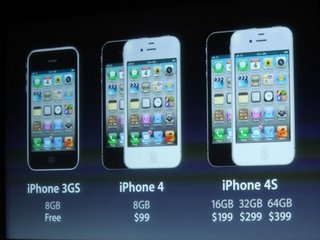
Is Apple's miss the result of a late iPhone 4S release, or something more?

In a surprising first for Apple, it missed analyst expectations in its fourth quarter—despite selling four million iPhone 4S units in its first weekend. Apple’s stock opened Wednesday morning at $403, marking a 4% drop—which kept on dropping throughout the day to finally close at $398.62, a 5.59% drop. But despite analysts’ disappointment over Apple’s still-amazing-but-not-quite-as-impressive performance, most remain confident that the quarter was just a fluke and Apple will pick back up again next quarter.
While Apple’s $28.27 billion in revenue was nothing to sneeze at—especially compared to the $20.34 billion it took home this time last year—its growth just wasn’t up to snuff. Specifically, iPhone sales—while higher this quarter than in previous quarters—failed to make the grade. Apple sold some 17 million iPhones this quarter, which was three million short of the 20 million most analysts were expecting. Indeed, some even put iPhone sales as high as 23 million.
The problem was that the iPhone 4S wasn’t released in September—before the end of the quarter. It was released in October. So those four million units sold in its first weekend—had the iPhone 4S debuted a month earlier—would have put Apple’s iPhone sales above consensus.
“Consensus simply didn’t factor iPhone transition,” wrote Sterne Agee analyst Shaw Wu. “iPhone expectations simply got out of hand.”
This is probably why Apple is forecasting higher-than-consensus revenue for the December quarter at $37 billion, compared to consensus forecasts of $36.6 billion. This is also a surprising first for Apple, which usually low-balls its forecasts so that come next quarter, it can consistently blow consensus estimates out of the park.
“We believe the Street underestimated the degree to which September was a transitional quarter for the iPhone,” wrote Morgan Stanley’s Katy Huberty. “But with strong iPhone momentum out of the gate in October, we don’t see the light iPhone shipments as a cause for concern.”
Huberty did, however, note the one inexplicable hitch in Apple’s earnings: lower than anticipated iPad sales. Consensus estimates put Apple’s iPad sales at 13 million units, but Apple ended up only selling just over 11 million—which is still an increase of 166% over the same quarter last year, but sales just didn’t meet analysts’ expectations.
While the lower than expected iPhone sales are easily explainable due to the later than normal release of the iPhone 4S, the low iPad sales don’t make a whole lot of sense, which is probably why some analysts have not been as quick to shrug off Apple’s strange performance.
“We advise not being too quick to dismiss the iPhone miss on product transition issues, as we believe this is going to be a recurring theme for Apple given the limited scope of variety it offers in the handset and tablet categories,” wrote Alex Guana of JMP Securities.
With all the dismay over Apple’s miss, you’d almost be surprised to find that Apple had another record-breaking quarter. In addition to increased revenue, Apple also saw $6.62 billion in net profit, compared to $4.31 billion this time last year. And the amount of cash the company has in the bank has leapt to $81.6 billion from $76.2 billion last quarter.

Related News


Behold: the iPhone 4S makes its debut

